I've personally tried out a bunch of project management tools over the years, and let me tell you—it can be a total minefield out there.
I've done the hard work for you and narrowed it down to the top 5 options that are perfect for marketing teams.
The best project management software for marketing teams
- Motion: Best for marketing teams struggling with time management and managing workload capacity
- Asana: Best for large marketing teams and enterprises (200+ employees)
- ClickUp: Best for small businesses and remote teams
- Trello: Best for simple visual project management
- Notion: Best for knowledge management and collaboration
Project management software: What your team should look for
When evaluating project management software for your marketing team, there are a few key things you'll want to consider:
- Collaboration features: The ability for team members to easily share updates, files, feedback, and more in real-time.
- Task management: Creating, assigning, and tracking the progress of individual tasks and larger projects.
- Workload capacity management: Visibility into team bandwidth to ensure tasks can be realistically completed on time.
- Customization: The flexibility to adapt views, workflows, automations etc. to fit your team's unique processes.
- Integrations: Connecting with other tools you already use like chat apps, cloud storage, design software and more.
So without further ado, let's get into the nitty-gritty details of each tool!
A quick look at our best project management software picks
Mo tion: Best for marketing teams struggling with time management and managing workload capacity
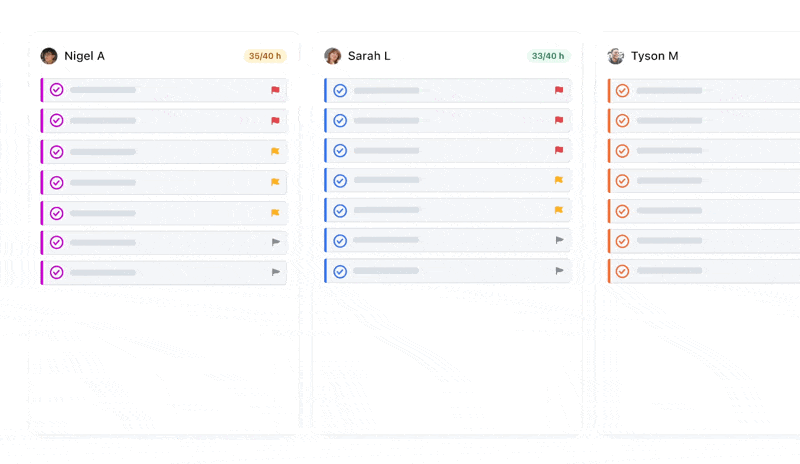
Standout features
- AI-powered time management and task scheduling
- Automatically schedules tasks on your calendar based on priorities, deadlines and availability
- Syncs all your work into one unified calendar view
- Visibility into team workload capacity to prevent overallocation
As a solopreneur and small marketing team veteran, let me tell you - Motion is a game-changer. This clever little tool combines your calendar, to-do list, and project management into one streamlined workspace.
What I liked
You know that feeling when you're juggling a million tasks, deadlines are looming, and you're just drowning in to-dos?
Yeah, I've been there too.
Motion has completely eliminated this for me. The best part is how seamlessly it fits into my existing workflow, so I'm not jumping between 100+ apps. And the AI scheduling? It's brilliant!
It automatically organizes my to-dos based on my availability and priorities. No more constant re-shuffling or playing task Tetris.
I also love how Motion gives you visibility into your bandwidth (+ your team's).
Let's say your boss dumps 30 hours of tasks on you this week, but you already have 20 hours worth of stuff on your plate and only 40 hours of actual capacity.
Without Motion, you'd have no clue you're overbooked until it's too late.
With Motion, you can see that conflict coming from a mile away and negotiate priorities before everything goes off the rails.
Here's the real game-changer though: Motion tells you exactly what to work on each day to meet your deadlines.
Most task managers just give you a never-ending list, but they don't actually prioritize what needs to get done first.
It's like having 100 tasks across 5 projects with deadlines all over the next month. How do you decide what to tackle today?
Do you even have enough time to meet all those deadlines?
It's a puzzle missing key pieces.
Tools like Asana, ClickUp, Trello and Notion get disorganized fast. I've seen how thousands of teams manage projects, and trust me, it's messy.
Without considering time, you get an infinite task list with no structure. Some tasks have deadlines, others don't. Some have layers of subtasks, while others just float around.
There's also zero visibility into what will actually get completed by when, especially if one person's task is blocking someone else's work. Managers waste time chasing updates, and team members spend too much time reporting instead of doing actual work.
With Motion's smart prioritization and planning, you can be confident you're knocking out the right tasks in the right order to meet deadlines.
No more staying late, feeling like you're constantly grinding but never catching up.
When you can clearly see what's important and urgent, you focus on the right work.
What I disliked
While Motion ticks a lot of boxes for small teams, it may not have enough firepower for larger, more complex marketing operations.
Advanced reporting, resource management, and granular permissions are a bit lacking compared to enterprise-grade tools.
But for marketing teams of up to 50 people, Motion is an absolute gem. It's affordable, easy to use, and makes staying organized a total breeze.
As ana: Best for large marketing teams and enterprises
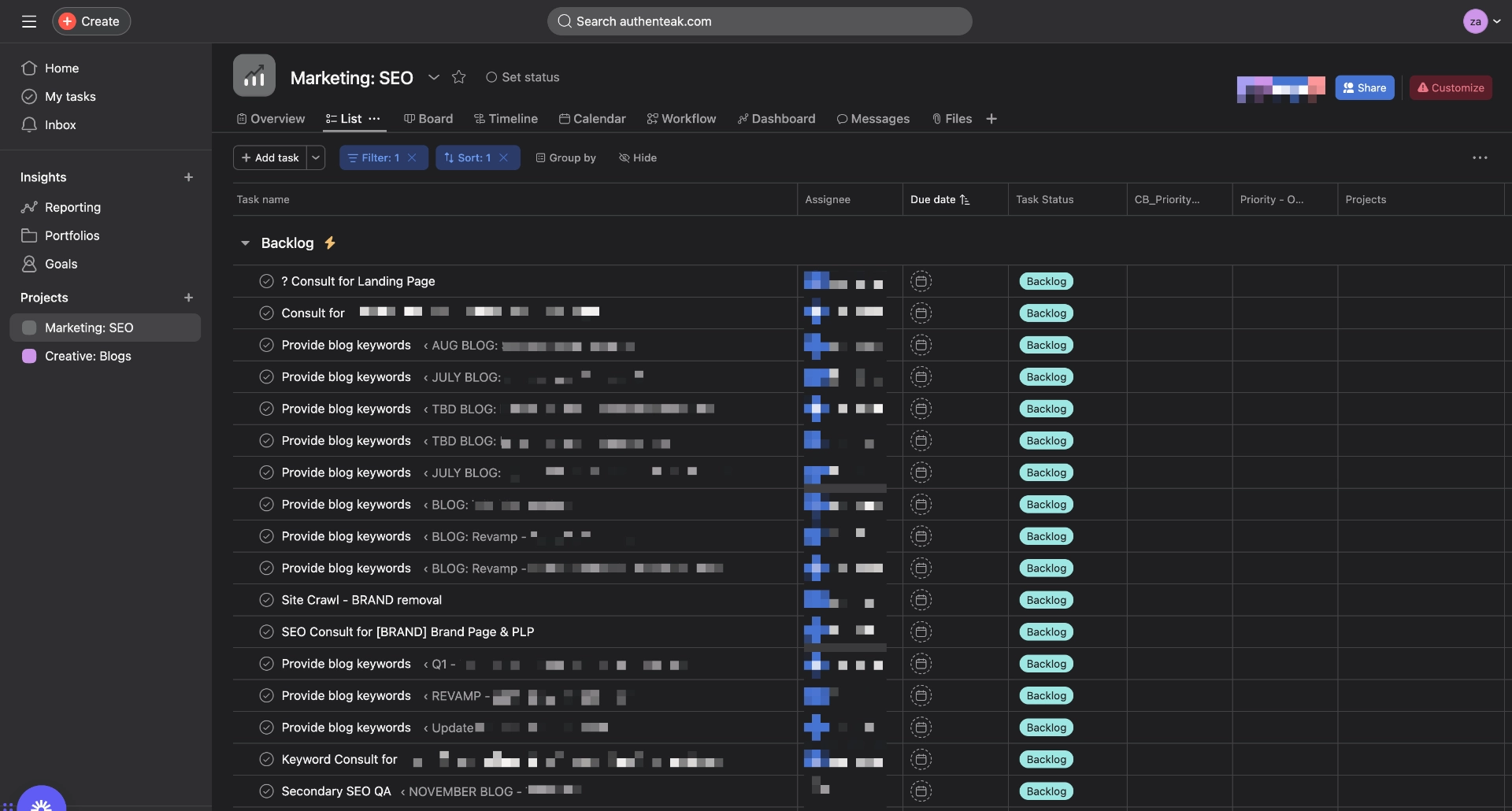
If you're part of a 200+ person company, Asana is a project management tool you absolutely need to consider.
This powerful platform has all the features to handle even the most complex, multi-faceted marketing campaigns and initiatives with ease.
Standout features
- Robust project planning and tracking
- Unlimited projects, tasks, and integrations
- Advanced reporting and analytics
- Automation and workflow builder
What I liked
Asana's flexibility is seriously impressive. You can customize virtually every aspect of your workflow, from tagging and custom fields to kanban board layouts.
This makes it super easy to adapt the tool to your agency's unique processes and client needs.
The reporting side is also a huge win - I loved having all our key metrics and progress visualized in one place.
No more scrambling for updates! Asana also integrates seamlessly with tools like Hootsuite, Salesforce, and Adobe Creative Cloud, which streamlined our marketing ops beautifully.
What I disliked
All that power does come with a fairly steep learning curve, I have to admit.
Expect to spend some solid time upfront mapping out your processes and training your team. Asana's UI can also feel a bit cluttered and overwhelming for new users.
The pricing is also a little eye-watering, especially if you want to unlock premium features like portfolios and custom rules.
But for large teams and agencies, the robust functionality is well worth the investment.
Cl ickUp: Best for small businesses and remote teams
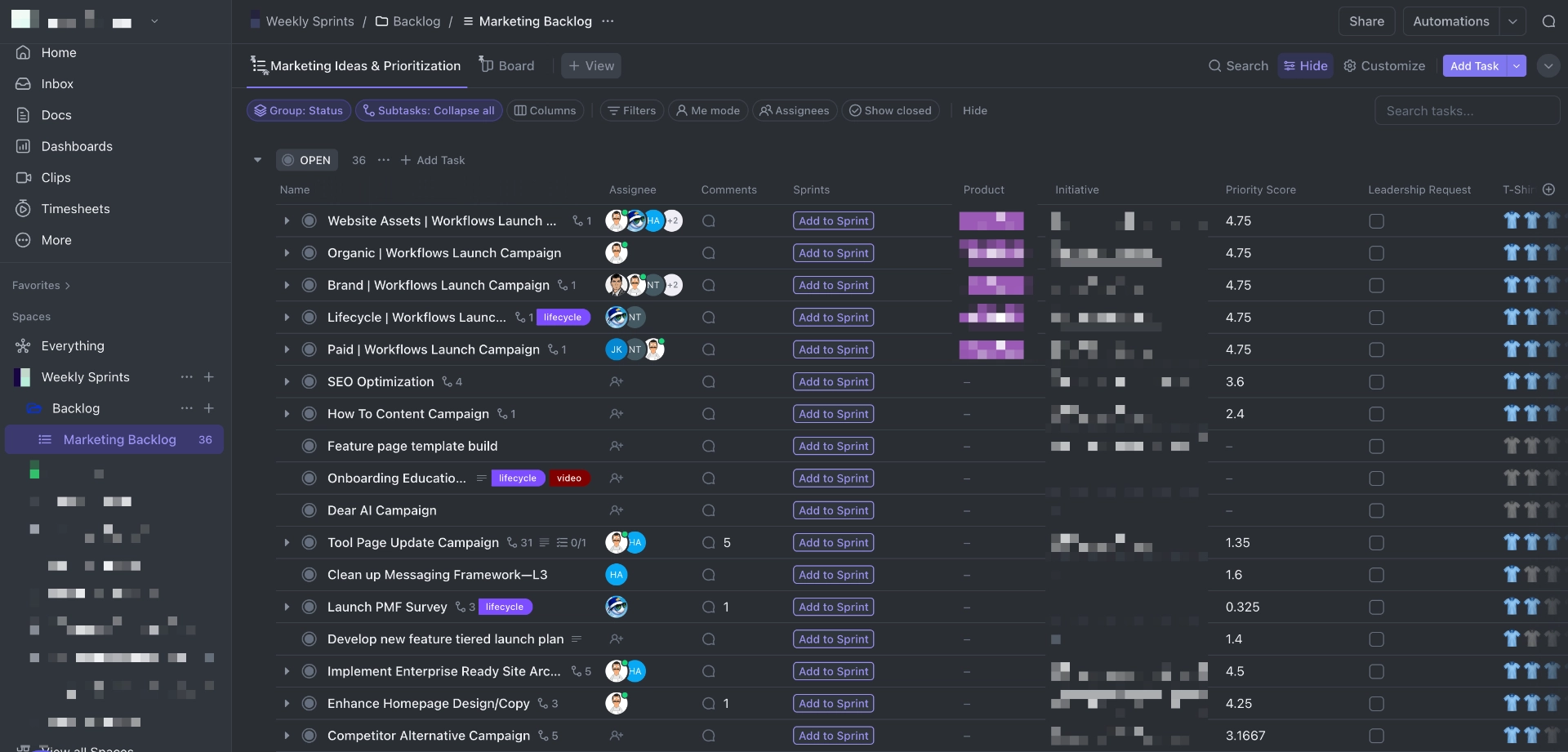
Keeping remote marketing teams aligned and productive is no easy feat—but ClickUp makes it a total breeze.
This all-in-one platform has all the collaboration tools you need to keep everyone marching to the beat of the same drum.
Standout features
- Powerful communication tools like comments, chat, and whiteboards
- Shared team calendars and scheduling
- Granular access controls and guest accounts
- Endless customization options for custom workflows
What I liked
ClickUp's real-time collaboration features are a game-changer for remote teams.
The comment streams let you hash out ideas seamlessly, while whiteboards allow for virtual brainstorming sessions.
You can even do video calls right inside ClickUp! I was also seriously impressed by the reminders and scheduling capabilities.
You can share team calendars, get notifications for upcoming tasks, and even automate hand-offs between teammates. No more dropped balls!
What I disliked
With such a vast feature set, ClickUp does have a notoriously steep learning curve and can be incredibly slow at times.
Prepare for a fair bit of trial-and-error as you customize the platform to your team's needs.
There's also the risk of feature bloat—with so many options, it's easy to overcomplicate your processes.
Performance-wise, some users report sluggishness when working with larger projects or data sets.
And if you want to unlock premium functionality like custom fields and integrations, be ready to pay a pretty penny.
Tr ello: Best for simple visual project management
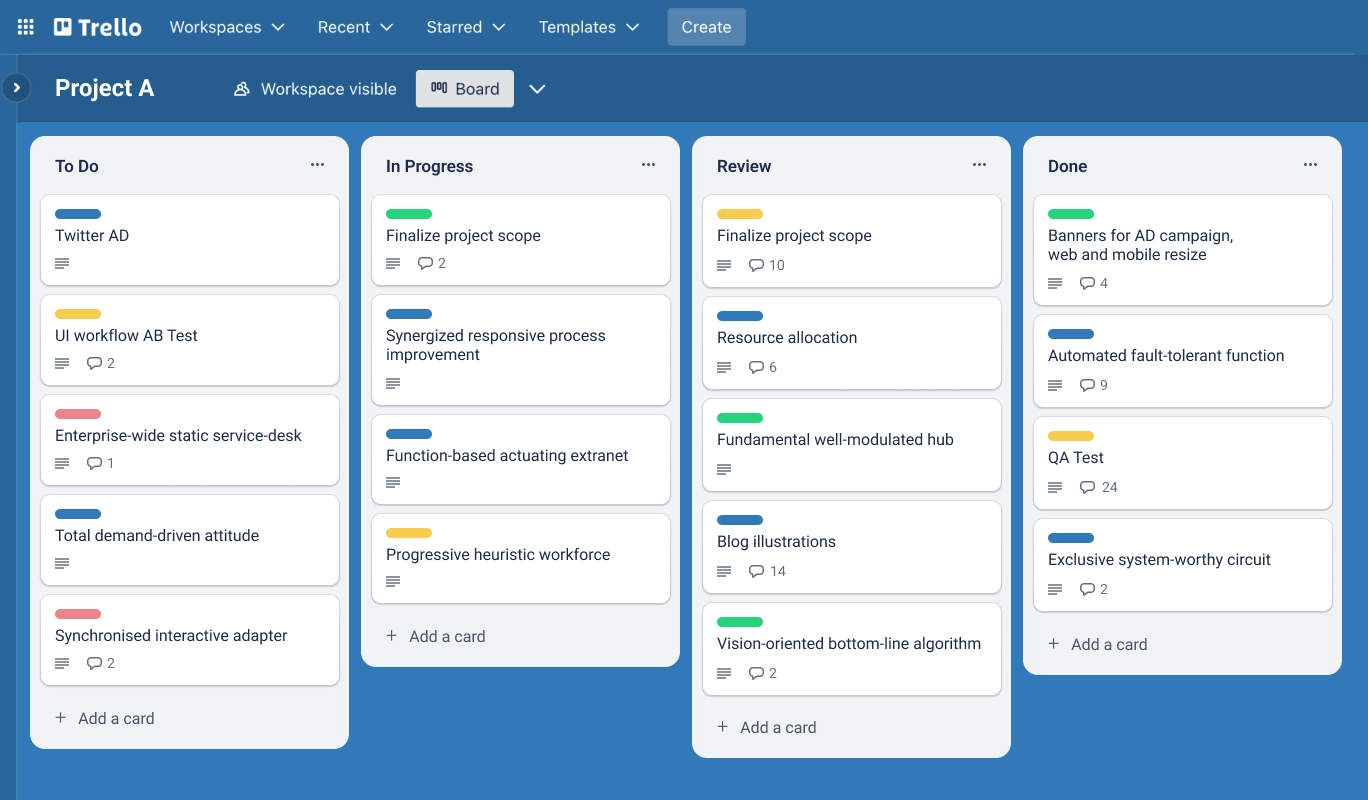
As a visual learner, I'm a huge fan of Trello's kanban board layout for managing marketing projects and campaigns.
This straightforward, card-based system makes it super easy to visualize your workflow and keep tasks organized.
Standout features
- Intuitive kanban board interface
- Drag-and-drop simplicity for organizing tasks
- Attachment uploads for sharing assets
- Butler automation for common actions
What I liked
Trello's genius is in its simplicity.
The interface is clean and user-friendly, with a minimal learning curve. Even non-techie teammates can jump right in and start managing tasks via the kanban boards and checklists.
I loved being able to drag and drop cards between columns to update their status.
And the attachment functionality made it easy to bundle tasks with creative assets, briefs, and other collateral.
Butler automation was also a nifty shortcut for recurring chores like moving cards or clearing checklist items.
What I disliked
While elegant, Trello is fairly limited in scope compared to more robust PM tools. It lacks advanced features like reporting dashboards, calendar integrations, and Gantt-style timeline views.
So you'll likely need to supplement it with other apps for more complex projects. Trello also doesn't handle task dependencies very well.
There's no easy way to link related cards or visualize critical paths - kind of a dealbreaker for project-heavy teams.
And as your Trello workspace grows, the lack of structure can make it feel cluttered and overwhelming.
No tion: Best for knowledge management and collaboration
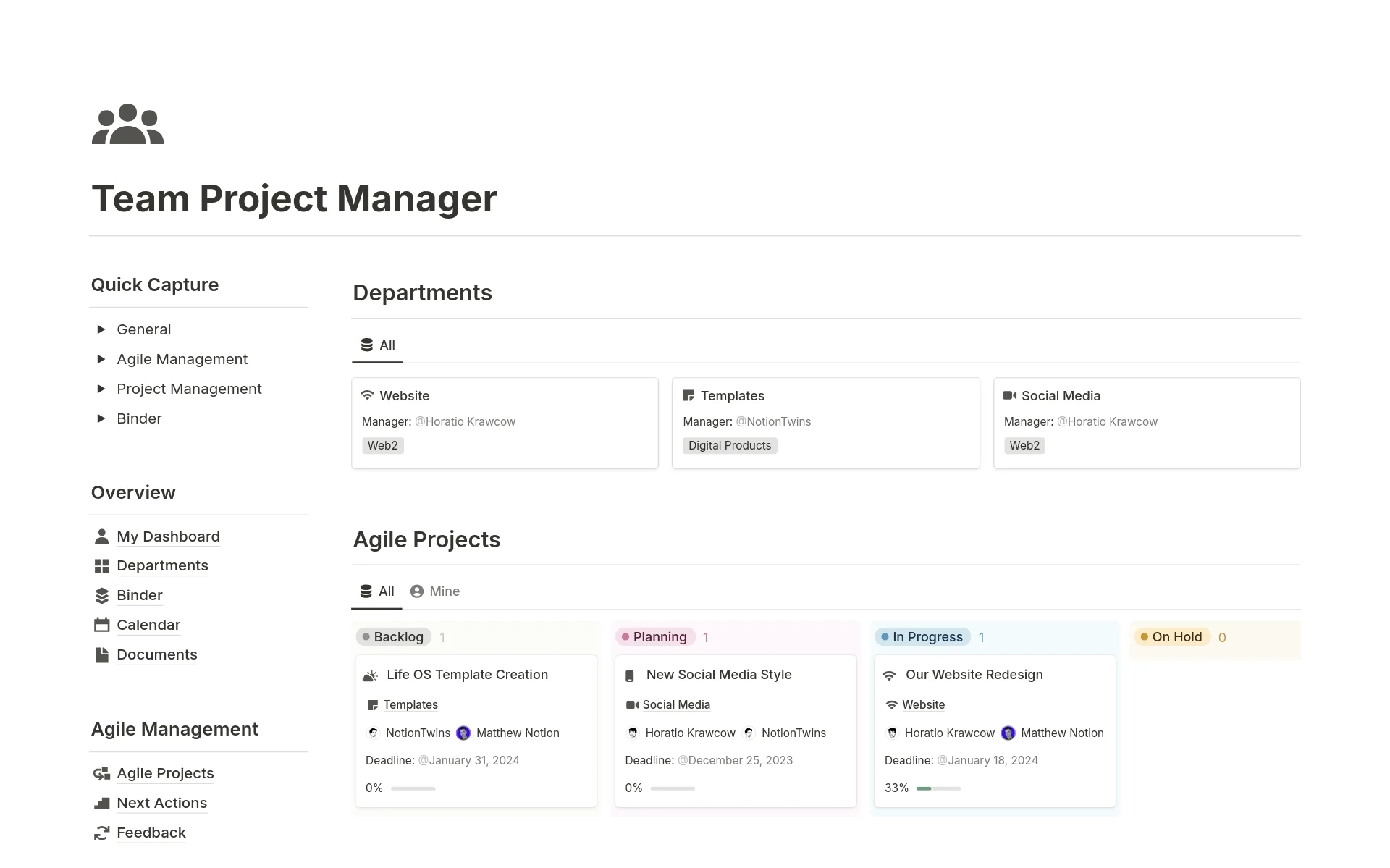
Having a central knowledge hub is absolutely vital for aligning your team and streamlining operations. That's where Notion really shines—it's like a digital workspace tailor-made for collaborating and sharing information.
Standout features
- All-in-one workspace for notes, docs, wikis and databases
- Beautifully customizable pages and templates
- Real-time collaboration and version control
- Robust integration and automation options
What I liked
With Notion, you can consolidate all your marketing documentation, SOPs, creative briefs, reports—you name it—into one super-powered workspace.
The page formatting options are top-notch, allowing you to create visually stunning wikis, project hubs, and client portals.
Real-time collaboration is another huge plus. Teams can work on pages simultaneously, leave feedback via comments, and track changes over time.
You can also create custom databases to manage things like content calendars, customer info, and more.
What I disliked
For all its content management wizardry, Notion does have some shortcomings on the actual project management front.
The flexibility that makes Notion so powerful can also be a double-edged sword.
With so many options, setting up your workspace can quickly become overwhelming—especially for new users.
Performance can also get bogged down when you're dealing with large, complex pages and databases.
Why marketing teams love Motion
If you're fed up with spending more time managing your work than actually getting things done, Motion might be the solution you’ve been waiting for.
Motion was built to help teams tackle their workloads head-on instead of just managing tasks.
Who is Motion ideal for?
Motion is perfect for:
- Companies of up to 100 people looking for an innovative way to manage projects and time.
- Busy professionals who need a powerful daily planner to manage their task list and schedule.
- Teams that need an efficient way to handle their workload and actually get stuff done without spending hours managing tasks and projects.
If you've tried tools like Asana, Jira, ClickUp, or Monday and found yourself spending too much time managing your work instead of working, Motion might be a breath of fresh air.
What can Motion do?
Project management
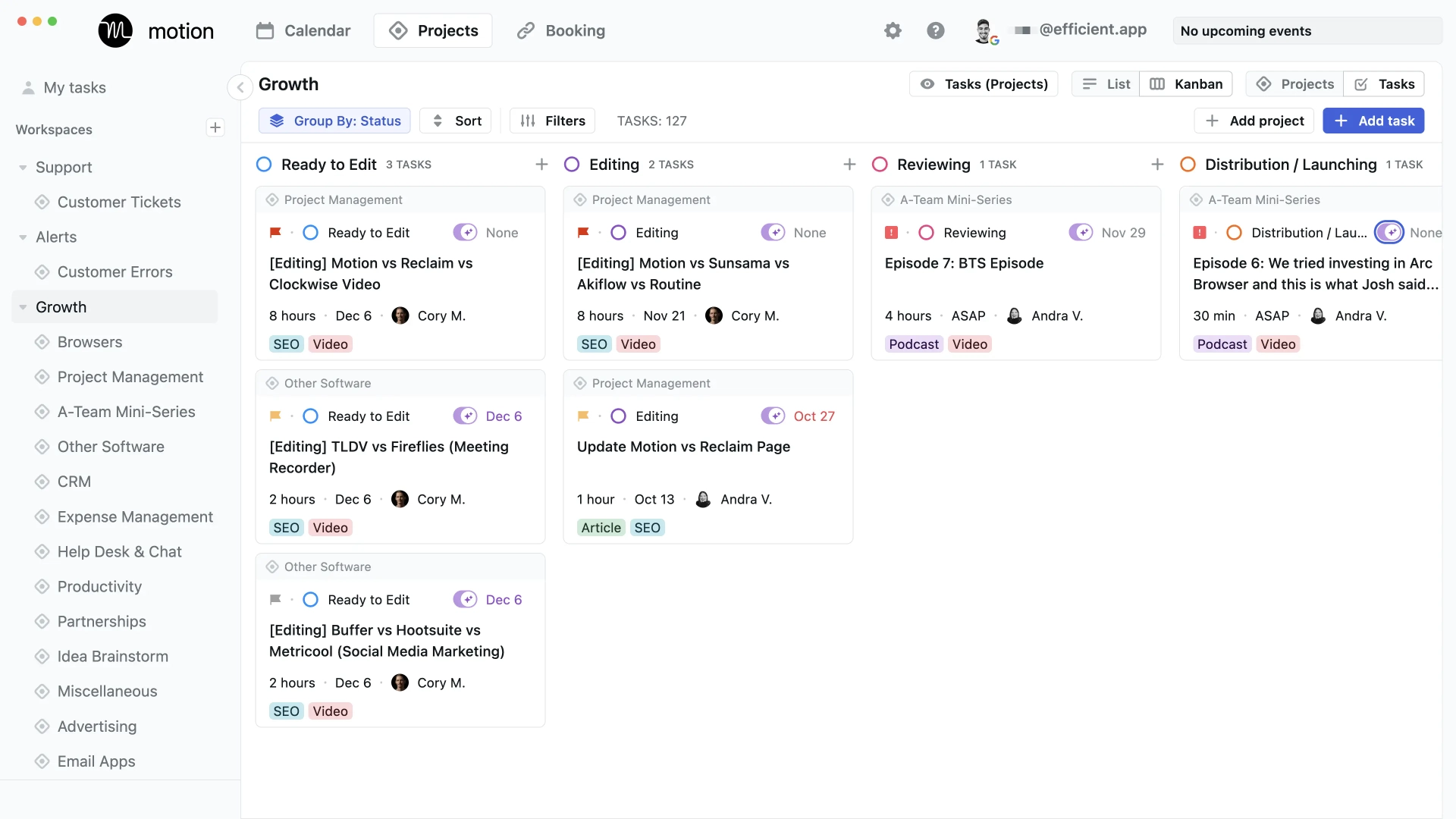
In terms of project management features, you'll get unlimited projects, a fully-featured task management tool equipped with the main task views you need, including list views, Gantt charts, and Kanban boards.
There's highly customizable task priority, deadlines, and task dependencies.
Motion allows you to track tasks and assign them across team members, making for a powerful team management system along with team collaboration features. You can set custom personalized or team-wide filtered views.
With other tools like Asana, you need to manually reschedule your tasks daily, wasting anywhere from 20–60 minutes per day—something you rarely need to think about with Motion. Team members using the Motion app report getting more done and worrying less about "figuring out what to do next."
Time tracking
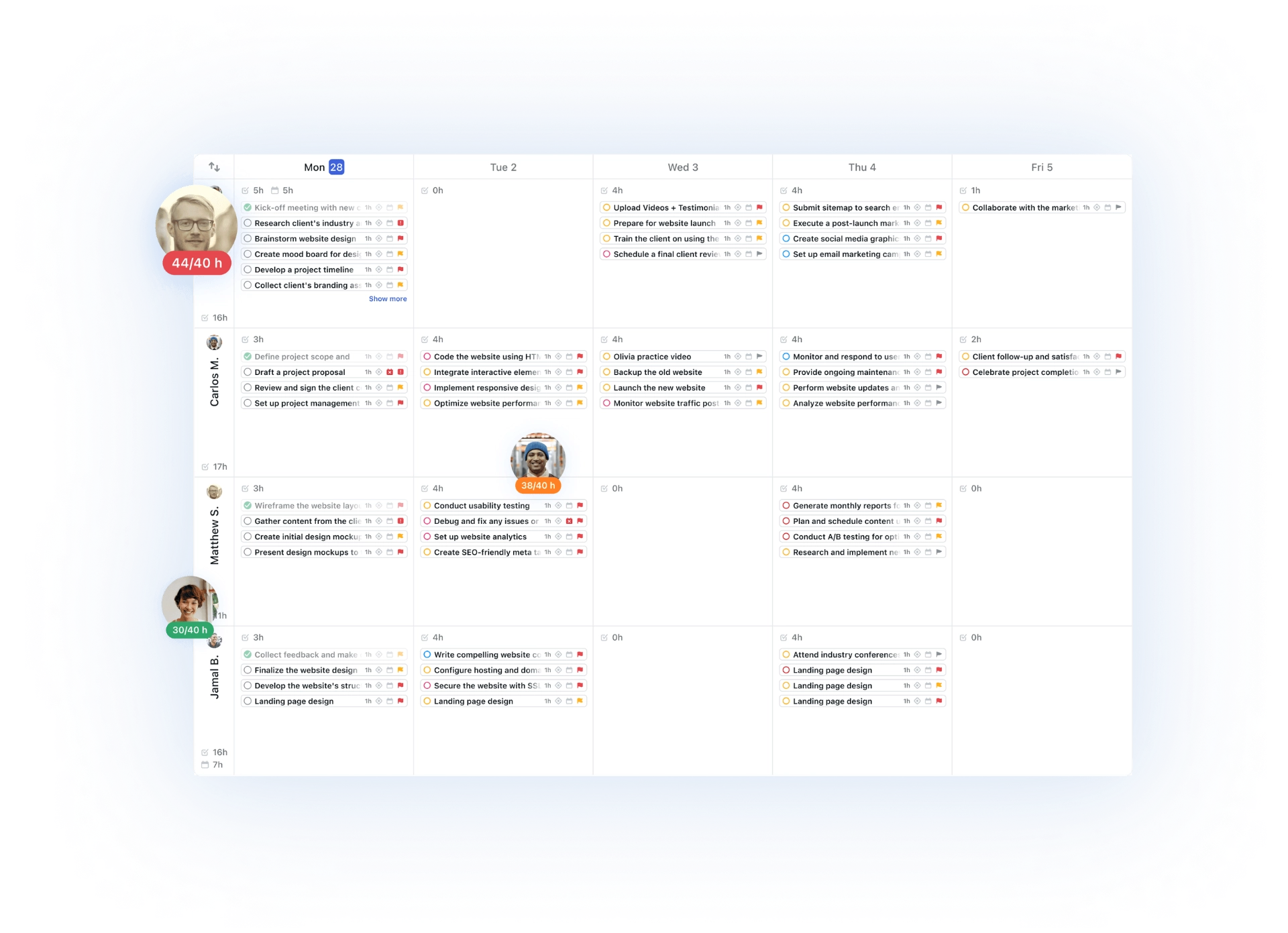
Motion has time tracking as one of its core features.
Every task has a duration and a "completed time" (so tasks can be partially completed), and you can even break longer tasks into smaller tasks by enabling chunks.
Pair that with the automatic scheduling, and you'll see first-hand the secret weapon of Motion—the AI technology that organizes your schedule like an executive assistant.
Team workload
Mix the task time tracking functionality with Motion being able to see team members' actual calendar events and availability, and you get an actual team workload view unlike any other.
The big miss with most project management software is that the calendar is an afterthought. If someone on your team is tied up in meetings all week and then has critical tasks assigned, do you think they’ll be able to get to them?
With Motion, this is made abundantly clear (even flagged automatically), whereas other project management tools require an executive assistant or full-time project manager to monitor these issues as they arise.
The final verdict: What's the best project management tool for marketing teams?
🥇 Motion
Now, I might be biased, as I'm writing on the Motion blog, but I've fully switched to Motion from Asana after using Asana and ClickUp for 5+ years.
The Motion app has been great for my team, helping us remember tasks we would have otherwise forgotten, manage projects, and collaborate better.
Motion is definitely worth trying, especially if you have up to 100 employees and need a simple, effective tool.
Motion solidifies itself as a productivity tool that once you start using, it's hard to imagine life without it—the AI algorithm is something you feel missing from every other alternative on the market.
Motion as a project management solution works well for teamwork projects, busy professionals, creative teams, remote teams, professional services, and development teams.
They don't have a free plan, but definitely give the free trial a shot before committing to an alternative.
That said, I finally found what I've been looking for in terms of the perfect tool for my team.
Start your 7-day free trial of Motion here 👇

Hey, I'm Zac 👋 I'm an SEO leader with a passion for helping brands build content that ranks and empowers their customers. Can often be found tinkering with AI, building sites, or attempting DIY projects.




